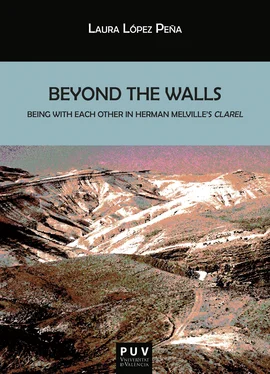Laura López Peña - Beyond the Walls.
Здесь есть возможность читать онлайн «Laura López Peña - Beyond the Walls.» — ознакомительный отрывок электронной книги совершенно бесплатно, а после прочтения отрывка купить полную версию. В некоторых случаях можно слушать аудио, скачать через торрент в формате fb2 и присутствует краткое содержание. Жанр: unrecognised, на английском языке. Описание произведения, (предисловие) а так же отзывы посетителей доступны на портале библиотеки ЛибКат.
- Название:Beyond the Walls.
- Автор:
- Жанр:
- Год:неизвестен
- ISBN:нет данных
- Рейтинг книги:3 / 5. Голосов: 1
-
Избранное:Добавить в избранное
- Отзывы:
-
Ваша оценка:
- 60
- 1
- 2
- 3
- 4
- 5
Beyond the Walls.: краткое содержание, описание и аннотация
Предлагаем к чтению аннотацию, описание, краткое содержание или предисловие (зависит от того, что написал сам автор книги «Beyond the Walls.»). Если вы не нашли необходимую информацию о книге — напишите в комментариях, мы постараемся отыскать её.
Beyond the Walls. — читать онлайн ознакомительный отрывок
Ниже представлен текст книги, разбитый по страницам. Система сохранения места последней прочитанной страницы, позволяет с удобством читать онлайн бесплатно книгу «Beyond the Walls.», без необходимости каждый раз заново искать на чём Вы остановились. Поставьте закладку, и сможете в любой момент перейти на страницу, на которой закончили чтение.
Интервал:
Закладка:
THE ETHICS OF INTERSUBJECTIVE UNIVERSALISM
“So we are neither one nor the other, we are really both. […] We are implicated in each other’s lives”, asserted Gloria Anzaldúa in a 1987 interview (243). This implication derives from the fact that human beings share the earth with one another, to the extent that actions in one part of the globe have consequences in the lives of those in other parts of the globe, close and distant. The Native American imaginary, for example, illustrates this interconnection in its conception of the world as a web in which each of the parts sustaining the whole are interlaced: the pulling of one string has an effect upon other strings constituting the web. Due to this inevitable and inescapable interconnection and interdependency, ethical relationships need to be understood beyond notions of community or proximity in order to be global in character. It is, however, as necessary as it is difficult to theorize ethics, since, as Zygmunt Bauman has noted, the need of morality cannot be discursively contended without turning such a call for humanity into an imperative or mandate. This is precisely, Bauman notes, what religious discourse does: from the moment religion prompts obedience to a commandment (e.g. to act moral or “love one’s neighbor”), such commandment absolutizes as a call for obedience that neutralizes free will and makes individuals paradoxically irresponsible, instead of resulting into a call for humanity encouraging and potentially activating our response-ability. Actually, in his analysis of philosopher Knud Ejler Løgstrup’s arguments on the ethical demand, Bauman notes that “[w]ere we told exactly what to do, ‘the wisdom, insight, and love with which we are to act’ would ‘no longer be our own’; the command would not be a call to humanity, imagination and insight—but to obedience; Christian ethics, in particular, would be ‘ossified into ideology’” ( Individualized 170). While not only Christianity but most—if not all—world religions certainly share in this “call to humanity” as their basic tenet, and while to many—perhaps the majority of—people around the globe religion may be an access to ethical responsiveness, this study defends that Melville turned to humanity in an Arendtian and Baumanian sense, beyond religious moral imperatives, in his evaluation of the ethics of intersubjective universalism.
Also Bauman has pointed out how, in face of the consolidation of corporate capitalism, consumerism, market economy, and money-oriented society, “human solidarity is the first casualty” (76). This is due to the fact that the possibilities for values such as sharing, cooperation, and mutual help are rejected in favor of individualism, competition, and economic sovereignty. But if plurality is the essential condition for the existence of the common world, as Hannah Arendt has theorized, individualism is one of its greatest menaces. This individualism can become a form that is a consequence of “conditions of radical isolation, where nobody can any longer agree with anybody else”, or it may appear under conditions of mass society (and also of nationalism and, more generally, forms of communitarianism based on a “common identity”), where people “act as though they were members of one enormous family which has only one opinion and one interest” ( Human 39). On the other hand, present-day globalization has not cohered the different regions of the globe on an equal basis, but has instead served the interests of capitalism and of certain dominant national powers. As a consequence, globalization has enforced an unequal economic development between different world regions; it has widened economic inequality and given rise to identitycentered projects asserting regionalisms, nationalisms, or particularisms in reaction against the homogenizing tendencies of globalization. In face of this situation, it comes as imperative to imagine ethical human relationships aiming not only to preserve the (dignity of the) lives of human beings in separate parts of the globe, but also to restore individuals’ connection with the world and the awareness of their mutual vulnerability, which both unites them with and separates them from other human beings. This ethics needs to be universalist in scope, in the sense that it should break through individualisms and communitarian ways of belonging (nationalism included) which are ultimately self-centered, excluding, dividing, hierarchical, and frequently damaging to others.
This global ethical dimension is constitutive of the universalist project this volume interprets in Herman Melville’s Clarel , since the poem points to intersubjectivity as the means through which a conscience of interhuman diversity, vulnerability, suffering, and connectedness, and, therefore, a global ethics based on interpersonal responsibility, might be created. Margaret Canovan has claimed in her introduction to Arendt’s The Human Condition that “[o]nly the experience of sharing a common human world with others who look at it from different perspectives can enable us to see reality in the round and to develop a shared common sense. Without it, we are each driven back on our own subjective experience, in which only our feelings, wants and desires have reality” (xiii). The sharing of the world, as Arendt has noted, is certainly horizontal and transnational, but also vertical and transtemporal ( Human 55). This expands our interhuman responsibilities not only in the direction of those human beings who cohabit the world with us in the present moment, but also of past and future generations. For thinkers like Arendt or Bauman, there is no question about why one should be responsible for those we do not know, trans-spatially, trans-temporally. As a matter of fact, Emmanuel Levinas noted that asking why one should be responsible for his or her fellow human beings already voices the death of morality, since the necessity to ask such a question indicates the deep individualism of contemporary societies, at the same time that it tragically reflects how human beings have cut off their connection with other human beings. Indeed, Levinas has vindicated that our obligations to other fellow mortals are innate. What is more, the philosopher identifies the self and the other 1 as inseparable and mutually constituent, arguing that moral responsibility for others pre-exists individuals. This means that the ethical demand is imposed upon each human being even before his or her existence, and that it is in relation to this ethical demand for the other that each individual develops his or her own self. This inevitable, innate, connection with and obligation toward the other also exposes the vulnerability of the self, since the other may actually harm the self in its attempts to approach the other’s self. Influenced by Levinas’s thinking, Judith Butler has also noted that this vulnerability “names both the necessity and difficulty of ethics” because “[i]t is surely hard to feel at once vulnerable to destruction by the other and yet responsible for the other” (“Precarious” 14). On the other hand, it is precisely this vulnerability that, Richard A. Cohen explains, “opens the human to the suffering of others” (xxxiv). As Levinas remarks, I cannot not respond to the other; from the moment I am born I am bound to the other in my responsibility for him or her, despite the fact that I did not choose the interlacing of our existences (“Without” 64). This responsiveness and responding to the other’s ethical demand, Levinas claims, is completely disinterested (“An-Archy” 57). In a similar way, and resonating with Derrida’s notion of hospitality, Gayatri Spivak also interprets one’s responsibility for the other as “a call to a relationship” by which the other is allowed a discursive space within the dialogic encounter ( Reader 5). This implies, Spivak claims, that dialogue is not centered only on one or other of the participants; it fluidly travels from one to the other and among all: it is, Spivak states, an “embrace, an act of love” (269-270). As Levinas argues, the identity of the self is its moral relationship with the other, which makes the self part of a human community bound together by individuals’ reciprocal responsibility for one another ( Humanism 6). This philosophy of interpersonal ethics is universalist in scope since it is based on a humanism which, like Arendt’s theorizations, renounces the conception of Man in the abstract, as a naked face removed from history and culture. 2 This defense of humanism, then, upholds a belief in the irreducible dignity and equality of each human being, and, in a way similar to Martin Buber or Jean-Luc Nancy, locates meaning precisely in this dimension of being characterized by interpersonal responsibility. Levinas’s thinking is informing to this study’s theoretical articulation of the ethical dimension of the universalist project in Melville’s Clarel : the philosopher’s arguments for what might be considered a global ethics based on interdependence and interpersonal responsibility resonate within the democratizing potentiality Melville’s works attributed to intersubjectivity. This interhuman responsibility is the ultimate justification and guiding principle on which Melville’s universalist project rests:
Читать дальшеИнтервал:
Закладка:
Похожие книги на «Beyond the Walls.»
Представляем Вашему вниманию похожие книги на «Beyond the Walls.» списком для выбора. Мы отобрали схожую по названию и смыслу литературу в надежде предоставить читателям больше вариантов отыскать новые, интересные, ещё непрочитанные произведения.
Обсуждение, отзывы о книге «Beyond the Walls.» и просто собственные мнения читателей. Оставьте ваши комментарии, напишите, что Вы думаете о произведении, его смысле или главных героях. Укажите что конкретно понравилось, а что нет, и почему Вы так считаете.










